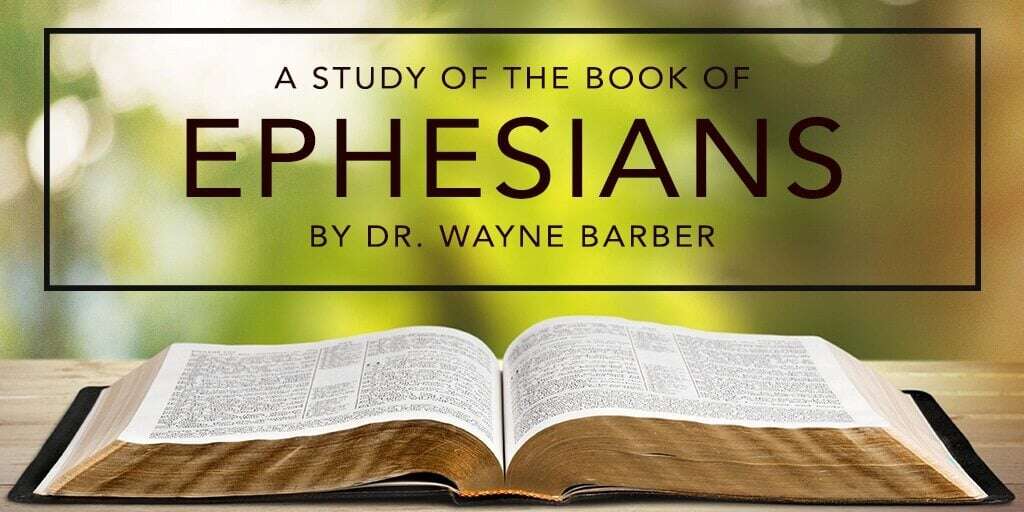If you think about it, every church is made up of 2 types of individuals: co-workers and consumers. A consumer is a spectator. A co-worker is a participator. A consumer shows up late to the service. A co-worker arrives early. A consumer criticizes everything that doesn’t line up with his or her preferences. A co-worker appreciates what God is doing in the church. A consumer comes to sit and get. A co-worker looks to go and serve. A consumer tunes to WIIFM: what’s in it for me. A co-worker tunes to WIIFY: what’s in if for you. A consumer only takes in. A co-worker pours out to others. A consumer sees himself as a cistern of truth. A co-worker sees himself as a channel of blessing. For some reason the thought that one could be a follower of Christ and not be active in the ministry is foreign in the scriptures. Today, we will see that God expects you to participate in ministry so that you grow up in Christ and build up the body of Christ. Every person was saved for a purpose and the purpose was never to glorify you. Eph. 4:11–16 11 It was He who gave some to be apostles, some to be prophets, some to be evangelists, and some to be pastors and teachers, 12 to prepare God’s people for works of service, so that the body of Christ may be built up 13 until we all reach unity in the faith and in the knowledge of the Son of God and become mature, attaining to the whole measure of the fullness of Christ. 14 Then we will no longer be infants, tossed back and forth by the waves, and blown here and there by every wind of teaching and by the cunning and craftiness of men in their deceitful scheming. 15 Instead, speaking the truth in love, we will in all things grow up into him who is the Head, that is, Christ. 16 From him the whole body, joined and held together by every supporting ligament, grows and builds itself up in love, as each part does its work.
God appointed the leadership (11–12) These four groups are foundational gifts by God to the church. The apostles” were the twelve, and “prophets” were those who preached in association with the apostles. These two groups were the bedrock of the church. F. F. Bruce, New Testament scholar, says: “the apostles as an order of the ministry of the church, were not perpetuated beyond the apostolic age, but the various functions they discharged did not lapse with their departure, but continued to be performed by others — notably the evangelists and pastors and teachers.”The Bible has replaced the roles of the apostles and prophets, but the other two groups are still present today: evangelists and shepherd/teachers The evangelist is a gift to the church. He has the unique ability to make the gospel plain and relevant to those who are lost. When you think of evangelists, men like D. L. Moody or Billy Sunday come to mind. The greatest evangelist of our time is Billy Graham. Did you know that everyone is called to do the work of an evangelist? 2 Tim. 4:5, “but as for you, be serious about everything, endure hardship, do the work of an evangelist, fulfill your ministry.” Finally, there are shepherd/teachers. The two words are combined into one single title. In the 4th century, preachers and theologians like Chrysostom and Augustine and even it the present day pastor and author John Macarthur believe these 2 terms describe one office. “shepherd” is another word for pastor and his chief goal is teaching. The greatest job of the shepherd is to feed the sheep. Paul told Peter to make feeding the sheep a top priority — as Christ three times charged peter to do (john 21:15–17). Did you notice the one characteristic that unites all 4 callings? Teaching. The greatest gift of the leadership of any church is to explain and expound the word of God. One seminary president mourned over the lack of biblical exposition from our pulpits, saying, “I would get on my knees and crawl across america to find someone who will teach my students to preach the text of the Bible.”There are men who don’t even open their Bible when they preach today. The sacred text has become a diving board at the end of the sermon, which the preacher leaves and never returns to. O’ how the sheep are starving to hear a word from God today. Not a cool illustration from the preacher, not funny stories every week, not creative videos. The greatest gift a pastor can give to his congregation is the faithful, expositional preaching of the word of God. My promise to you is that we will come to the text and study God’s word every single week.
God anticipated disciplemaking (13–14) There has been some confusion over what this verse means. In older versions of the english Bible, there was a small, but serious inaccuracy that may have contributed to lack of ownership of ministry on the part of the members of the church. The point of contention is a comma. In the original King Jamess version (which has been changed in more recent editions), Ephesians 4:11–12 said, “and he gave some, apostles; and some, prophets; and some, evangelists; and some, pastors and teachers; for the perfecting of the saints, [comma] for the work of the ministry, for the edifying of the body of Christ.” So the natural translation of office of pastors is that he does 3 things: 1) equip the saints, (2) do the ministry, and (3) edify or build up the body of Christ. The pastors are the ones called by God, so they must do the work of God. But the comma is not in the original greek. English translations added that later. Look at the passage without the comma. There is 1 task given to the minister and 1 to the church members or laity. The pastor equips the saints, and the members do the work of ministry. But when we search the New Testament, we see the word minister or ministry always referring to every Christian. There never was a distinction between the two groups. Pop quiz: How many are believers of Christ? How many are disciples of Christ? How many are saints of Christ? All of the above are synonymous with each other. According to the Bible, the saints are believers. Romans 1:7, “to all who are in rome , loved by God , called as saints.” 1 Cor. 1:1, “Paul , called as an apostle of Christ Jesus by God’s will , and sosthenes our brother : 2 to God’s church at corinth , to those who are sanctified in Christ Jesus and called as saints , with all those in every place who call on the name of Jesus Christ our Lord — both their Lord and ours.” Eph. 1:1, “Paul , an apostle of Christ Jesus by God’s will : to the faithful saints in Christ Jesus at Ephesus.” Phil. 1:1, “Paul and timothy , slaves of Christ Jesus : to all the saints in Christ Jesus who are in Philippi , including the overseers and deacons.” Col. 1:1, “Paul , an apostle of Christ Jesus by God’s will , and Timothy our brother : to the saints in Christ at Colossae , who are faithful brothers . Grace to you and peace from God our Father.” Why do I make this distinction? We, as the saints or disciples of Christ, are all called to carry out the ministry. So how do the saints do the work of ministry? Participation. This is 2 fold:
- You need to realize that you can do the work of ministry. Whether it is visiting someone who is sick, serving in the preschool, setting up for worship, handing out bulletins on sunday morning, or making a phone call to a member who lost a loved one, you can help.
- You also need to realize that ministry happens even when the pastoral staff isn’t present. Or even when the senior pastor isn’t there.
- What could our church be if everyone participated at our church? Children, preschool, and students?
- Who could we reach if you served in the inner city, overseas, and everywhere in between?





Leave a comment